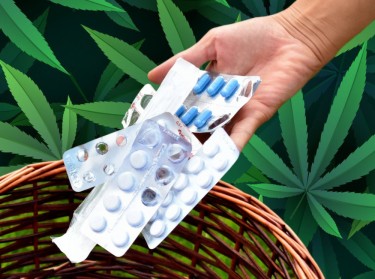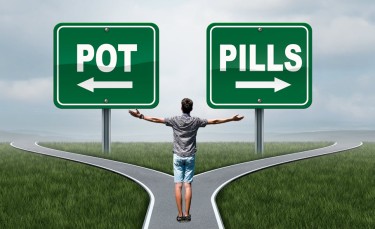Does Medical Marijuana Work? – 9 Out of 10 MMJ Patients Reduce Prescription Drug or Alcohol Use, or Both, Says New Study

According to a survey conducted by EO Care, Inc., 88% of medical cannabis users reported that it reduced their reliance on prescription drugs, alcohol, or both. Additionally, 51% of respondents expressed a likelihood or strong inclination to utilize cannabis if it were offered through their health plan.
This survey encompassed 1,027 participants from states where cannabis was legally accessible for either medical or recreational use. It also revealed that 65% of those surveyed would feel more at ease using cannabis for medical purposes if it were professionally administered and dosed by a qualified clinician.
Of the participants, 18% had used cannabis for health-related reasons in the past year, 19% had used it recreationally, and 14% had employed it for both medicinal and recreational purposes. The most prevalent motivations for cannabis consumption among respondents were anxiety, pain relief, and sleep enhancement.
In a statement, Sean Collins, co-founder and CEO of EO Care, emphasized the challenges in obtaining clinical guidance for medicinal cannabis, given the limited knowledge among most medical practitioners and the inadequate provision of medical advice in retail dispensaries.
As a result, we see tens of millions of Americans turning to cannabis for health reasons, lacking essential guidance on product recommendations, proper dosage, potential drug interactions, and consideration of their medical history and associated health risks. Considering that the sales of cannabis for health purposes surpass those of most prescription drugs, this presents a significant concern for healthcare as a whole,” stated Collins in a press release.
The survey also unveiled that 56% of participants indicated they would be more inclined to work for a company offering cannabis-based healthcare in their employee benefits. In comparison, 44% would reconsider applying to a company that conducts prior cannabis use testing or prohibits off-duty cannabis use.
Collins further remarked, “Ninety-four percent of Americans reside in states where cannabis holds some legal status. We’re aware that a substantial portion of the population has used cannabis in the past year, and this is undeniably impacting employees and their health outcomes.
With appropriate guidance on medicinal cannabis, employers can assist their workforce, enhance health results, and become pioneering leaders in providing a crucial benefit that employees will increasingly expect.
The Opioid Crisis and the Role of Medical Cannabis
The opioid epidemic has emerged as one of the most critical health challenges of the 21st century, causing widespread suffering in communities across the United States and beyond. Prescription opioids, such as OxyContin and Vicodin, though frequently prescribed for pain relief, have led to a troubling increase in overdoses and fatalities due to their highly addictive properties.
Medical cannabis is now emerging as a hopeful alternative for managing chronic pain, offering the potential to reduce dependency on opioids. Multiple studies have demonstrated that patients using medical cannabis to alleviate pain often require lower opioid doses or can even entirely replace them.
For example, a study published in JAMA Internal Medicine in 2018 revealed that states with legalized medical cannabis experienced a 14.4% decrease in opioid prescriptions, indicating a significant connection between access to medical cannabis and reduced opioid usage.
The endocannabinoid system, an intricate network of receptors spread throughout the body, plays a pivotal role in pain regulation. Cannabinoids, the compounds found in cannabis, interact with this system, providing a potential pathway for non-addictive pain management. While further research is necessary to fully grasp the long-term effects and safety of using medical cannabis as a substitute for opioids, the initial findings are promising.
Alcohol and Cannabis: A Shifting Relationship
The interplay between cannabis and alcohol is complex and often influenced by individual preferences and societal norms. Some individuals have reported turning to medical cannabis as an alternative to alcohol for managing stress, anxiety, and social situations. This substitution effect has raised questions about the potential of medical cannabis to decrease alcohol consumption.
Research has indicated that in states with legalized medical cannabis, there has been a decrease in alcohol-related traffic accidents and fatalities. This correlation is attributed to the idea that people may opt for cannabis instead of alcohol when it’s legally accessible. While some individuals may use both substances concurrently, the overall impact is still a reduction in alcohol consumption.
It’s essential to recognize that the relationship between cannabis and alcohol is not uniform for everyone. For specific individuals, combining cannabis with alcohol can lead to heightened impairment and an increased risk of accidents. The influence of this intricate relationship remains an active area of research and debate, and its effects vary from person to person.
Challenges and Concerns
The potential advantages of medical cannabis in diminishing the utilization of prescription medications and alcohol are not devoid of challenges and apprehensions. Detractors contend that additional research is imperative to ascertain the safety and effectiveness of medical cannabis for various medical conditions. The absence of standardized dosages and regulations across states and nations can also give rise to complications.
Furthermore, while medical cannabis may curtail the consumption of prescription drugs and alcohol for some individuals, it can have a contrary impact on others. Certain people might employ medical cannabis alongside other substances, heightening the potential for unfavorable interactions and potentially leading to more substantial health concerns.
Moreover, the stigma associated with cannabis in many regions of the world continues to be a significant impediment. Individuals may be reluctant to explore medical cannabis as a treatment option due to societal norms, legal reservations, or the fear of being categorized as recreational users.
Conclusion
The EO Care, Inc. survey unveils a fascinating shift in the realm of medical cannabis, showing a growing inclination among users to replace prescription drugs and alcohol with this natural alternative. An impressive 88% of respondents reported a reduced dependence on these substances, highlighting the potential of cannabis in healthcare.
Yet, this journey is not without its challenges. The survey underscores the pressing need for professional guidance and standardized dosing in the realm of medical cannabis, navigating the uncharted waters of a budding industry.
Furthermore, it delves into the intriguing dance between cannabis and alcohol, revealing how the former might become a contender in reducing alcohol consumption. However, it also highlights the complex, individual-specific dynamics at play.
Nevertheless, the survey paints a vivid picture of a rapidly evolving landscape in which societal norms are being reshaped, and medical cannabis is emerging as a compelling player in healthcare’s future.
GETTING OF PRESCRIPTION DRUGS WITH MMJ, READ ON…
DOES CANNABIS LOWER OPIOID USE BY 11% ALREADY IN AMERICA?




